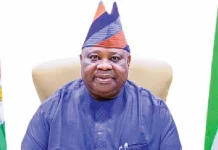A crucial discussion about how far citizens should go to protect themselves when the government appears incapable or unwilling to do so is becoming more heated as insecurity continues to rage throughout Nigeria. A growing chorus of voices, from destroyed villages to legislative chambers, are questioning the boundaries of self-defense and calling for greater rights and access to resources that could enable communities to fend off attacks. Joseph Titilope writes
The national security discussion is being subtly reshaped by a surge of civic unrest. More communities are facing the sobering question: if the state is unable to protect us, do we not have the right to defend ourselves? This is due to the constant attacks by armed groups and a security system that is either completely nonexistent or overworked.
Although self-defense is permitted by Nigerian law under certain restrictions, the rise in citizen-led protest is taking the discussion beyond legal theory. There is a developing crisis of legitimacy as the state seems to be faltering, and villagers, clerics, attorneys, and lawmakers are all embroiled in a heated argument about how far people should go to protect life and land.
Fr. Benjamin Versue, a Catholic priest in Katsina-Ala, Benue State, stood in front of the burned-out remnants of a church rectory that he claimed to have sacrificed everything for in early August. He said that after suspected herdsmen overran Ayetwar village and drove its occupants from their ancestral homes, they set fire to the building. Fr. Versue not only lamented a building on social media, but he also blasted the Nigerian government for failing to safeguard its people.
In a frustrated tone, he added, “Congratulations to the Nigerian army for successfully disarming the people and rendering them vulnerable to their attackers.”
His claims of military collusion are yet unsubstantiated, but they reflect a growing belief in many rural areas that the Nigerian government is incapable or unwilling to defend them.
Farmer-herder conflicts have long been common in Benue, but similar tales of suffering and powerlessness are now coming out of the Plateau, Southern Kaduna, Zamfara, and portions of Niger and Sokoto states—areas where residents claim they are subjected to violent invasions with little to no official response. Many have started to support the right to fight back as a remedy for the lack of state protection.
Every citizen of Nigeria has the right to life under Section 33(2)(a) of the 1999 Constitution, however if someone is killed while defending themselves or others from unlawful violence, that right is not breached.
The use of force in self-defense is permitted by both the Criminal Code (which applies in southern Nigeria) and the Penal Code (which applies in the north), as long as the force is appropriate and proportionate to the danger.
However, when applied to actual circumstances in war areas, this legal certainty starts to become hazy. According to human rights attorney Chioma Nwafor, “the law permits private defense, but it does not permit vigilantism or a free-for-all arms race.” The problem is that individuals in many rural regions believe they have no other option.
The right to self-defense has been supported by a number of recent judicial decisions, but with restrictions. The court emphasized that force must be necessary and not excessive in Ekpoudo v. State (2021).
The Supreme Court dismissed a self-defense argument in Sunday Jackson v. State, concluding that the defendant had engaged in excessive force during a domestic dispute.
Therefore, the legislation establishes a high bar for what constitutes legal self-defense, even while it does not prohibit Nigerians from doing so. What constitutes a “reasonable” defense can become tragically subjective in a nation where assailants frequently operate in huge numbers and brandish automatic weapons.
Former Defense Minister Gen. T.Y. Danjuma caused a sensation in 2022 when he openly counseled Nigerians to defend themselves “by any means necessary” in the event that the government did not. Similar views have since been expressed by governors such as Samuel Ortom of Benue and Aminu Masari of Katsina, who have called for more rights for neighborhood vigilante organizations and even for citizens to have access to firearms under stringent control.
A bill that proposed a framework for civilian gun ownership was brought to the Senate in 2024 and was sponsored by Senator Ned Nwoko.
The law, which is currently being considered, would allow anyone to carry firearms for self-defense as long as they are licensed, undergo a psychological evaluation, and have their backgrounds checked.
Read Also: NCAA Grants Gateway Airport Green Light for Commercial Operations
Opponents caution that this might result in an increase in violence, unintentional shootings, and gun abuse. Femi Falana (SAN), who contends that arming individuals is insufficient in lieu of police reform and investments in intelligence-led security, stated, “We’re walking a dangerous line.”
The bill’s proponents contend that, after the state’s repeated failures to provide its citizens with the means to defend themselves, it is time for the Nigerian government to do so.
Informal local defense units have formed in several areas of Plateau State; some are led by village youth, while others are supervised by traditional leaders.
There are concerns that citizen-led security may become violent, sectarian, or criminal, even while some communities have been successful in preventing attacks, while others have fallen into cycles of retaliatory killings.
A middle ground is being advocated by civil society organizations, which include bolstering community policing, investing in local intelligence collection, and fostering trust between security forces and rural communities.
According to Jos-based peace-building specialist Fatima Yunusa, “it’s not just about guns.” It has to do with honor. People desire to be heard, seen, and safe.
Today’s agitation in Nigerian communities goes beyond a simple desire for retribution. It is an urgent cry for protection, dignity, and agency. The nation is at a turning point as more citizens begin to doubt the legitimacy of a government that is unable or unwilling to protect them.
Can inclusive security reforms and legal community empowerment help Nigeria strengthen its social contract? Or will it observe as residents take matters into their own hands, sometimes with irrevocable results, and trust continues to erode?
Self-defense is not a purely theoretical issue. It comes to life in the stories of uprooted villages, the remains of a burned church, and the passionate pleas for justice that reverberate throughout a troubled country.
Join Television Nigerian Whatsapp Now
Join Television Nigerian Facebook Now
Join Television Nigerian Twitter Now
Join Television Nigerian YouTUbe Now





